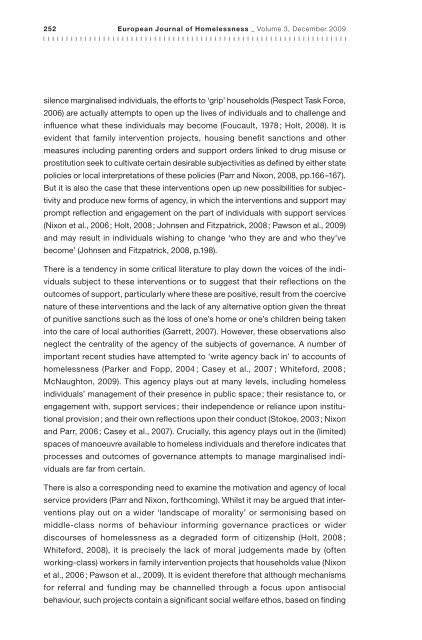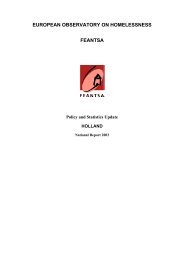Part A - Feantsa - Horus
Part A - Feantsa - Horus
Part A - Feantsa - Horus
You also want an ePaper? Increase the reach of your titles
YUMPU automatically turns print PDFs into web optimized ePapers that Google loves.
252 European Journal of Homelessness _ Volume 3, December 2009<br />
silence marginalised individuals, the efforts to ‘grip’ households (Respect Task Force,<br />
2006) are actually attempts to open up the lives of individuals and to challenge and<br />
influence what these individuals may become (Foucault, 1978 ; Holt, 2008). It is<br />
evident that family intervention projects, housing benefit sanctions and other<br />
measures including parenting orders and support orders linked to drug misuse or<br />
prostitution seek to cultivate certain desirable subjectivities as defined by either state<br />
policies or local interpretations of these policies (Parr and Nixon, 2008, pp.166–167).<br />
But it is also the case that these interventions open up new possibilities for subjectivity<br />
and produce new forms of agency, in which the interventions and support may<br />
prompt reflection and engagement on the part of individuals with support services<br />
(Nixon et al., 2006 ; Holt, 2008 ; Johnsen and Fitzpatrick, 2008 ; Pawson et al., 2009)<br />
and may result in individuals wishing to change ‘who they are and who they’ve<br />
become’ (Johnsen and Fitzpatrick, 2008, p.198).<br />
There is a tendency in some critical literature to play down the voices of the individuals<br />
subject to these interventions or to suggest that their reflections on the<br />
outcomes of support, particularly where these are positive, result from the coercive<br />
nature of these interventions and the lack of any alternative option given the threat<br />
of punitive sanctions such as the loss of one’s home or one’s children being taken<br />
into the care of local authorities (Garrett, 2007). However, these observations also<br />
neglect the centrality of the agency of the subjects of governance. A number of<br />
important recent studies have attempted to ‘write agency back in’ to accounts of<br />
homelessness (Parker and Fopp, 2004 ; Casey et al., 2007 ; Whiteford, 2008 ;<br />
McNaughton, 2009). This agency plays out at many levels, including homeless<br />
individuals’ management of their presence in public space ; their resistance to, or<br />
engagement with, support services ; their independence or reliance upon institutional<br />
provision ; and their own reflections upon their conduct (Stokoe, 2003 ; Nixon<br />
and Parr, 2006 ; Casey et al., 2007). Crucially, this agency plays out in the (limited)<br />
spaces of manoeuvre available to homeless individuals and therefore indicates that<br />
processes and outcomes of governance attempts to manage marginalised individuals<br />
are far from certain.<br />
There is also a corresponding need to examine the motivation and agency of local<br />
service providers (Parr and Nixon, forthcoming). Whilst it may be argued that interventions<br />
play out on a wider ‘landscape of morality’ or sermonising based on<br />
middle-class norms of behaviour informing governance practices or wider<br />
discourses of homelessness as a degraded form of citizenship (Holt, 2008 ;<br />
Whiteford, 2008), it is precisely the lack of moral judgements made by (often<br />
working-class) workers in family intervention projects that households value (Nixon<br />
et al., 2006 ; Pawson et al., 2009). It is evident therefore that although mechanisms<br />
for referral and funding may be channelled through a focus upon antisocial<br />
behaviour, such projects contain a significant social welfare ethos, based on finding




